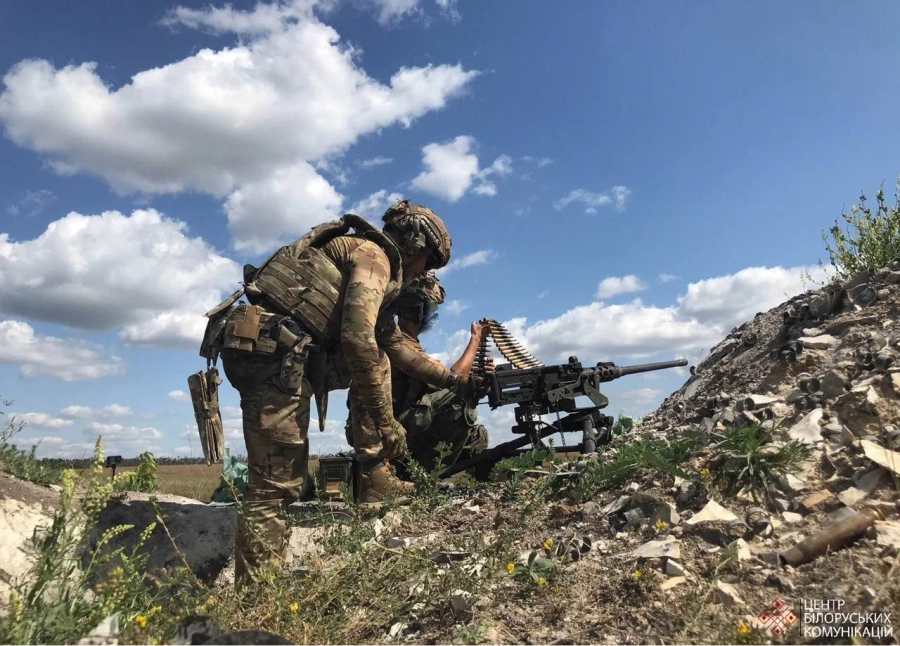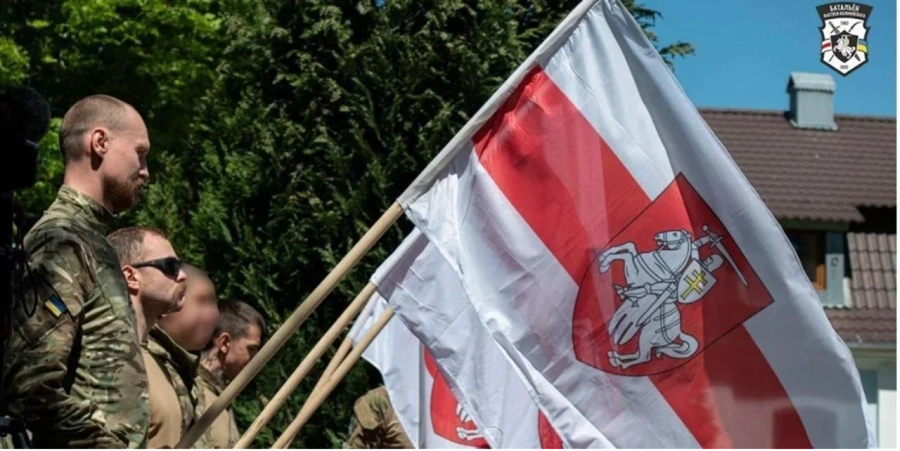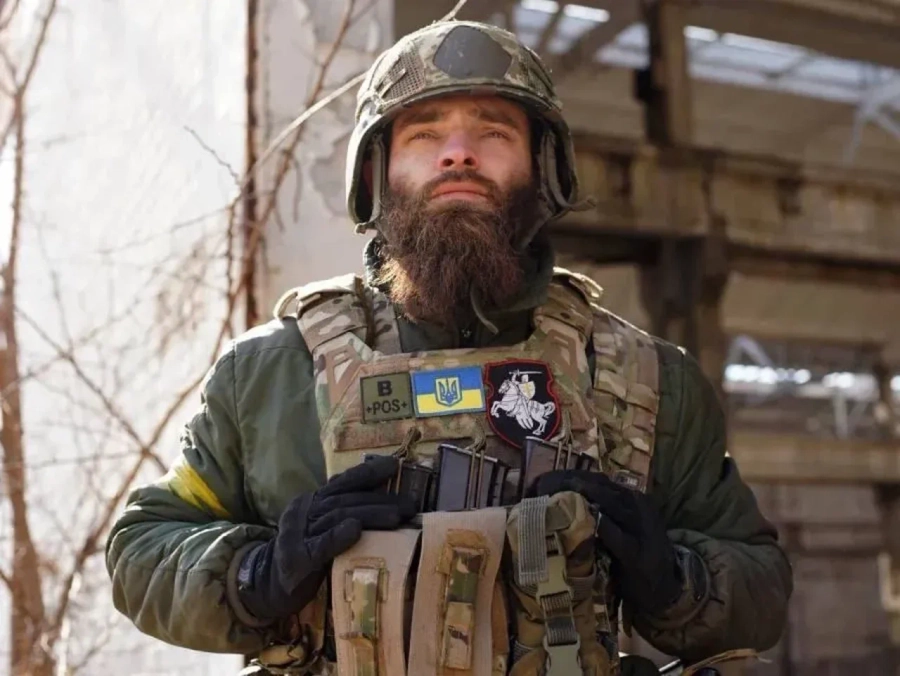In one foreign regiment that’s been fighting the Russian army in Ukraine for two years and counting, hundreds of soldiers have no homeland to go back to.
The Armed Forces of Ukraine’s force of volunteer Belarusians, formally known as the Kastus Kalinoŭski Regiment, is manned overwhelmingly by men and women born in and citizens of Ukraine’s northern neighbor.
JOIN US ON TELEGRAM
Follow our coverage of the war on the @Kyivpost_official.
Belarus’s authoritarian President Aleksandr Lukashenko, a close ally of Russia and a supporter of the Kremlin’s assault on Ukraine, has declared all Belarusians fighting on Ukraine’s side traitors and collaborators with a “Fascist” regime in Kyiv.
During a day of Kyiv Post interviews at a Ukraine army training area (regimental staff requested the location not be published for security reasons), soldiers in the regiment said they had no choice but to cut practically all ties with their homes, because the Lukashenko regime would hunt them and their families down if it could.
Almost all interviewees requested their identities not be made public. One rare exception was Daniel Olenius, 28, a former resident of Rechytsa, a town in the Gomel region. The Belarusian authorities had been tracking him for years, he said, because he protested against the Lukashenko’s police state tactics and his frequent visits to Poland. Russia’s invasion of Ukraine, Olenius said, left few him options but to help Ukrainians resist a Kremlin that had sponsored Lukashenko and oppression in Belarus for more than two decades.

Russia’s Invasion of Ukraine: 3 Years and Counting
“I have no ties with my parents, no contact with them,” Olenius said. “I don’t know when I can return home. The thing now, is to fight.”
Olenius joined up in autumn 2022 and for the next year served as a radio operator. The hairiest and most rewarding work he did, he said, was helping evacuate casualties. The regiment has sufficient communications equipment including NATO issue radios, Olenius said. Now he’s in logistics.
The Kastus Kalinoŭski Regiment was formed in early March 2022 when 400 to 500 Belarusian volunteers linked up through social media and travelled to Ukraine to fight the Russian army. It was bitter, urban combat in those days, mostly around Kyiv and the frontline towns f Bucha and Irpin.
By early 2024, 56 Belarusian citizens had died in Ukrainian military service, most while assigned to the Belarusian Regiment, a unit spokeswoman said.
The Armed Forces of Ukraine (AFU) has not made public formal organizations or standardized equipment lists for the probably dozens of small- and medium-sized foreign volunteer units now deployed by Kyiv against Russia. Soldiers interviewed by Kyiv Post said their contracts give them standard AFU pay. One fighter, a Frenchman, said his Ukrainian salary – provided it’s paid – compares favorably with the Foreign Legion.
According to interviewees, soldiers in the Belarusian regiment are not part of a formal AFU unit per se, but rather formally employed by the International Legion, a parent organization managed and financed by the AFU’s Main Directorate of Intelligence (HUR). Individual foreign unit missions vary dramatically in the AFU from formation to formation, with some international units permanently assigned to regular AFU brigades, some small groups employed as specialist teams, and others formed into conventional units armed and equipped by Kyiv for specific wartime jobs.
In the case of the AFU’s Kastus Kalinoŭski Regiment, the AFU armed the Belarusians along the lines of a NATO-standard light infantry battalion, without many heavy weapons like tanks and self-propelled artillery, but with plenty of man-portable firepower like the French-German Milan guided anti-tank missiles, the US-Belgian M2 .50 caliber heavy machine guns, and medium 120mm mortars.
Two fighters assigned to a Belarusian foreign legionnaire unit fighting on the side of Ukraine prepare an M2 .50 machine gun for operation at a Ukrainian training area. Image published in April 2023 by the Center for Belarusian Communications.
Since Russia’s February 2022 invasion of Ukraine, AFU high command has for the most part deployed its Belarusians into hot spots where the Russian army was pushing hard, particularly inside a town or a city. In September 2023, during battles around Bakhmut, Belarusian infantry patrols were among the first Ukrainian forces to counterattack, helping to contain a major Russian offensive and capturing key high ground and a village called Klishchiivka.
In June 2022 the Belarusians were one of a host of small infantry units thrown by the Ukrainian high command, over several months, into bitter, house-to-house fighting in the Donbas cities Severodonetsk and Lysychansk. During the latter battle, the regiment took heavy losses including Ivan Marchuk, a battalion commander and a regiment co-founder. Prior to the Russo-Ukrainian war Marchuk served in the French Foreign Legion.
Mark (nom de guerre) is a 43-year-old 120mm mortar section commander with the regiment since its founding. Like many long-service soldiers, he started out as an infantryman. He told Kyiv Post the regiment prides itself as an outfit that fights hard, in part because none can return to Belarus.
Belarusian fighters in Ukrainian army service at a 2022 memorial ceremony. Image provided by the Kastus Kalinoŭski Regiment.
In his case, Mark said, years of police raids and bribe demands forced him to leave a successful business in Minsk. His wife was eight months pregnant at the time. Contact with relatives in Belarus is dangerous because of probable retaliation by police.
“Our son was born a refugee,” he said. “No one can say when he can come home.”
Andriy Yusov, senior HUR spokesman, in April comments singled out the Kalinoŭski regiment as one of the most effective foreign formations fighting for Ukraine today.
“This is an extremely efficient unit. They conducted many successful operations and executed many missions successfully,” Yusov said, in April comments to the Center of Belarusian Communications think tank. The Kalinoŭski Regiment… has proved itself very well in terms morale, motivation and combat capacity. This unit is an integral component of the defense security forces of Ukraine,”
The working regimental language is Russian, but some Belarusians interviewed by Kyiv Post spoke excellent Ukrainian. Mark said weapons are available but “there could be more” mortar ammo.
In part to fill losses, and in part to buff soldier skill, the Kalinoŭski regiment is now raising a contingent of non-Belarusian foreign fighters. One new recruit, a Polish national identifying himself as Yura, served as senior NCO in the Polish army and 10 years after that in private military companies, primarily in combat engineering.
“I (as a Pole) work very smoothly with the Belarusians. We are all soldiers, and we usually understand each other because we are all in the same profession, and we approach the job in much the same way,” Yura said. “But for sure it helps that Polish is so close to the languages they speak in the regiment.”
A French national identifying himself with the nom de guerre Snow told Kyiv Post that the unit seems well run, but in-processing for new recruits is slow and some soldiers go two or three months without receiving pay.
Ivan “Brest” Marchuk, commander of one of the two battalions in a Ukrainian light infantry unit formed from Belarusian volunteers, died in combat on June 26, 2023, in the Donbas city Lysychansk, during house-to-house fighting against Russian forces using tanks and artillery. A reported six other Belarusians were killed or taken prisoner in the battle. Image published by the Ukrainian news magazine Oboz.ua.
Snow told Kyiv Post he was frustrated that he had travelled across Europe and deserted the French Foreign Legion only to sit for months at a training base doing nothing, with a war on, and without pay because his paperwork is delayed.
A regiment spokeswoman confirmed to Kyiv Post that new members of the regiment experience pay delays of a month or more, but that the finances are eventually sorted out. Kyiv Post requested a HUR spokesman comment on pay delays for foreign fighters.
An HUR representative contacted Kyiv Post and said comment on allegations about regimental pay issues would be possible only in a direct interview. Kyiv Post has agreed to the condition and will publish GUR comment in due course.
More information and background on the Regiment in Ukrainian, Russian, Belarusian and English can be found here.
You can also highlight the text and press Ctrl + Enter














